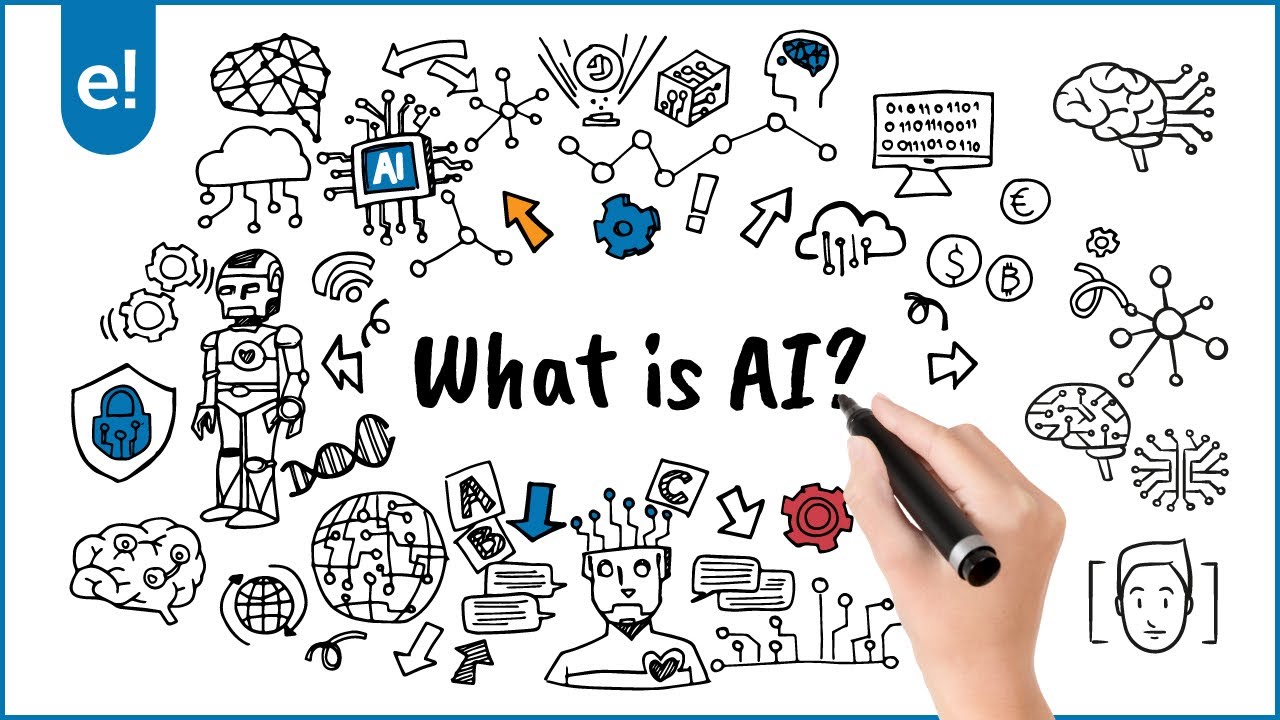Artificial intelligence explained in 2 minutes: What exactly is AI?
Summary
TLDRArtificial Intelligence (AI) refers to computer systems that perform tasks typically requiring human intelligence, such as image recognition, decision-making, and dialogue. AI systems can be programmed with specific instructions or use machine learning to learn from data. It is prevalent in various aspects of life, including entertainment recommendations, language translation, robotics, autonomous vehicles, medical assistance, and personalized education. AI is not meant to replace humans but to support and enhance our capabilities, highlighting the need for an AI-literate society.
Takeaways
- 🤖 Artificial Intelligence (AI) is the ability of computer systems to perform tasks that typically require human intelligence.
- 👀 AI capabilities include image recognition, decision-making, and engaging in dialogue.
- 💾 AI systems gain knowledge and experience through programming or learning from data, known as machine learning.
- 🎬 We encounter AI in our daily lives through recommendations in films, music, and online shopping.
- 🗣️ AI can convert spoken language into text and translate it into different languages.
- 🤖 AI is integral to robotics, making our lives easier and handling strenuous tasks.
- 🚗 Self-driving vehicles use AI to recognize their environment and react accordingly.
- 🩺 AI plays a significant role in medicine, assisting in diagnosing diseases and in patient self-assessment through apps.
- 🏫 In education, AI personalizes learning experiences on digital platforms.
- 🌐 AI is becoming increasingly important across various sectors, and understanding it can help us utilize it better in our daily activities.
- 🤝 AI will not replace humans but is designed to support us, necessitating an AI-competent society.
Q & A
What is the definition of Artificial Intelligence (AI)?
-Artificial Intelligence refers to the capability of computer systems to perform tasks that typically require human intelligence, such as recognizing images, making decisions, or engaging in dialogue.
How can AI systems be equipped with knowledge and experience?
-AI systems can be equipped with knowledge and experience either by programming each individual instruction for the machines to solve tasks step by step, or by using programs that learn from data themselves through machine learning.
What is the difference between programmed AI and machine learning AI?
-Programmed AI follows a set of instructions provided by humans, similar to a recipe, while machine learning AI learns from data to detect information, draw conclusions, and make predictions without explicit programming for each task.
In what ways have you likely interacted with AI in your daily life?
-You may have interacted with AI through recommendations in films, music, or online shopping, as well as through AI's capabilities in language translation and robotics.
How does AI contribute to the field of robotics?
-AI is a central component of robotics, enabling robots to make our everyday lives easier and take on strenuous activities by automating tasks and improving efficiency.
What role does AI play in self-driving vehicles?
-AI in self-driving vehicles recognizes the environment and reacts to it, ensuring the vehicle can navigate and make decisions autonomously.
How is AI being utilized in the medical field?
-AI supports doctors in diagnosing diseases and is also used by patients through AI-based apps for initial diagnosis, enhancing medical efficiency and accessibility.
What is the impact of AI on the educational sector?
-AI helps individualize learning activities on digital platforms, tailoring educational content to the needs and pace of individual learners.
Why is it important to understand how AI works?
-Understanding AI helps us identify where it can support everyday activities at home and work, and where human decision-making is preferable, leading to a more AI-competent society.
Will AI replace humans in the future?
-AI is not intended to replace humans but to support us by getting better at assisting in various tasks, enhancing productivity and efficiency.
What does it mean to be an AI-competent society?
-An AI-competent society is one that understands AI's capabilities and limitations, effectively integrates AI into various sectors, and ensures ethical and responsible use of AI technologies.
Outlines

此内容仅限付费用户访问。 请升级后访问。
立即升级Mindmap

此内容仅限付费用户访问。 请升级后访问。
立即升级Keywords

此内容仅限付费用户访问。 请升级后访问。
立即升级Highlights

此内容仅限付费用户访问。 请升级后访问。
立即升级Transcripts

此内容仅限付费用户访问。 请升级后访问。
立即升级浏览更多相关视频

What is Artificial Intelligence for Kids | What is AI | AI for Kids | AI explained for Kids |AI Kids

Was ist Künstliche Intelligenz («KI», in Englisch «AI»)? – einfach erklärt | Kindervideos | SRF Kids

Inteligência artificial: o que é, história e definição

Artificial Intelligence in 2 Minutes | What is Artificial Intelligence? | Edureka

O QUE É A INTELIGÊNCIA ARTIFICIAL (AI)?

MENGUAK AI DALAM 5 MENIT ! Definisi, Konsep Dasar dan Cara kerja AI || Artificial Intelegent #ai
5.0 / 5 (0 votes)
